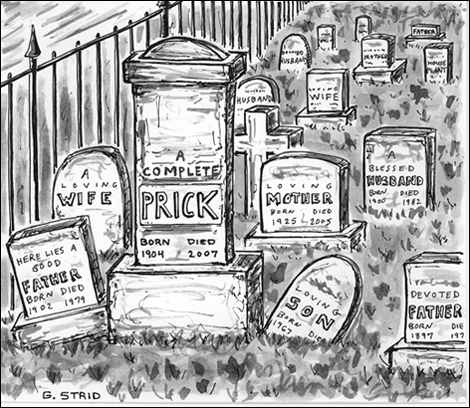 “Why should I spend money for a funeral if my dead relative can’t give me anything in return?” That is the current Czech attitude toward their deceased relatives, says David Stejskal, a local grave digger. He also says that the moral in the Czech Republic is decreasing every year which goes hand in hand with a loss of respect for the dead. Many relatives just pay the necessary fees for the person to be buried but no ceremony is being held. Some people even refuse to bury them at all and in that case the state has to take care of the body and pay for the funeral itself. Last year the government had to pay over 2 million crowns just for these unclaimed burial fees.
“Why should I spend money for a funeral if my dead relative can’t give me anything in return?” That is the current Czech attitude toward their deceased relatives, says David Stejskal, a local grave digger. He also says that the moral in the Czech Republic is decreasing every year which goes hand in hand with a loss of respect for the dead. Many relatives just pay the necessary fees for the person to be buried but no ceremony is being held. Some people even refuse to bury them at all and in that case the state has to take care of the body and pay for the funeral itself. Last year the government had to pay over 2 million crowns just for these unclaimed burial fees.
“About 4 years ago I dealt with a mother who was not interested in burying her 12-year-old disabled daughter’, says Stejskal. The secretary for the funeral bereau Mr. Hajek blames this embarrassing problem on the fact that for many Czechs death is something tabu and no one likes to talk about it (or think about death) in the first place. It depends on the region though; people in Moravia are more religious then in Bohemia and they tend to be more responsible and respectful about funerals.
CZ: “Proc vydavat penize na pohreb ci nahrobek, kdyz nam mrtvi jiz nic nedaji?” To je pry podle hrobnika Davida Stejskala dnesni postoj ceske spolecnosti k pohrbum. Tento mravni upadek a neuctivy pristup k mrtvym si vysvetluje hlavne tim, jak buji konzumni spolecnost. Mnoho pozustalych bud zaplati jenom za pohrbeni a ne za obrad anebo se k neboztikovi vubec neprihlasi a pak za to musi zaplatit stat. V minulem roce musel zaplatit za pohrby pres 2 miliony korun!
“Pred 4 lety jsem zazil pripad, kdy matka nemela zajem pohrbit svoji 12-ti letou postizenou dceru”, rekl Novinkam Stejskal. Tajemnik Sdruzeni pohrebnictvi Josef Hajek ma za to, ze nezajem o pohrby souvisi s tabuizaci tohoto tematu, a to jiz od dob socialismu – lide o smrti neradi mluvi a neradi si ji pripousti. Zalezi ale take na tom, odkud clovek pochazi. Napriklad na Morave je vice vericich lidi nez v Cechach, a tudiz maji vetsi uctu k zesnulym.
Source: http://www.novinky.cz/domaci/177256-ucta-cechu-k-mrtvym-upada-stale-casteji-odmitaji-pohrbit-pribuzne.html
If you liked this post buy me a coffee! (Suggested:$3 a latte $8 for a pound) Thanks!




Funny that you should write about this today because I was just talking to this Filipino lady today and she said that her culture respects elderly so much than most of the cultures she has gotten in contact with. They NEVER put them to old folk homes (and I imagine they give them a proper funeral too)!
by the way, my grandma was put to the old folks home and she died next week :((
Yes, it is bad in Czech lands.. Here, in US, the funeral future is rosier.
After the health care reform (overhaul), the government will take care of people from the birth to very death…
And if you bury your ancestors on your property (land),
in case of a foreclosure, you will be bailed out…
All other dead bodies will be recycled and will serve as a fertilizer for corn, which will be converted to a bio-fuel….
..recycled as a fertilizer for corn which will become bio-fuel…brilliant idea!!! :)) Except I would not want to be taking a walk through these corn fields….Not a pretty look…;)
I love the idea of driving our beloved president’s limo as a bio fuel 🙂 I would feel soooo powerful 😉
no tak, Vlastiku, ovladej se..;))
Interesting discussion! An African friend of ours years ago told us that they set the table for the deceased for a year after they are buried. Then, they give away all their belongings, have a prolonged drunken party in their honor and never mention their name again. In our family, the tradition is to prepay for your own funeral and write instructions for the kind of religious ceremony you want to have. There is a reception of friends before the ceremony and the the family gathers for another reception after internment (whether casket or cremation). We share funny stories about the deceased. Everyone goes home. In my church, we view death of the ill and elderly as something to celebrate…a new and better beginning.
Wow, that’s the craziest thing- leaving the table set for that person for a year! That definitely shows a respect for that person,I like that.
Now that I am a Christian I also see death differently – ‘a new and better beginning’ (which for some means more than for others if they are very sick for example).
MaryLena Anderegg
MaryLena Anderegg: I am not religious but I agree with your church. If a person die (of natural causes), there is a reason to celebrate. When my dad died, I was very sad, but at the sma time I was happy (go figure) and I felt kind of responsibility to carry the torch to give it to next generations.
It kind of sucked, because according to bible, some people lived 500 – 600 years. Why only couple of few can live a biblical age?
Sarka, you’re definitely right about how Filipinos deal with old age and death. It is next-to-unthinkable for a Filipino to say this: “Why should I spend money for a funeral if my dead relative can’t give me anything in return?” unless this guy has been proven an absolute good-for-nothing.
Instead, they think, “What have they given to us when they were still alive?” or “How did they affect my life when they were still alive?” or “What memory do I cherish with this person when they were still alive?”
I have never heard of such attitude in my life. I even thought that they will, at least, cremate the remains, but it seems that it wasn’t the case.
In the Philippines, there will always be a ceremony for a burial. They will even hold a wake or even hold worship services before burial!
Luckily in Moravia, the souls of the departed seem to be better off because what is more painful than dying is being forgotten.